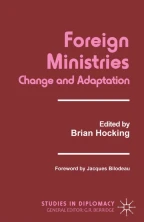Malaysia Change and Adaptation in Foreign Policy: Malaysia’s Foreign Ministry

The core concern of any foreign ministry is to safeguard by acts of diplomacy the sovereignty, integrity and territory of the political entity to which it belongs — in short, the national interest — in an asymmetric and predatory world of nation-states. This statement may well be challenged by those who identify changes in the international system arising out of trends in regionalism, multilateralism and globalism. 1 In addition, rapid advances in communications and information technology (IT) have resulted in the world becoming a global village or indeed, a ‘borderless world’, 2 suggesting a reduced role for foreign ministries and their functionaries.
This is a preview of subscription content, log in via an institution to check access.
Access this chapter
Subscribe and save
Springer+ Basic
€32.70 /Month
- Get 10 units per month
- Download Article/Chapter or eBook
- 1 Unit = 1 Article or 1 Chapter
- Cancel anytime
Buy Now
Price includes VAT (France)
eBook EUR 42.79 Price includes VAT (France)
Softcover Book EUR 52.74 Price includes VAT (France)
Tax calculation will be finalised at checkout
Purchases are for personal use only
Preview
Similar content being viewed by others

The ‘Post-state’ Argument and Its Problems: Lessons from Media Policy Reforms in Latin America
Chapter © 2016

Globalization and History in Brazil: Communication, Culture, and Development Policies at a Crossroads
Chapter © 2014

The Influence of Populism and Nationalism on European International Cultural Relations and Cultural Diplomacy
Chapter © 2020
Notes
- For an elaboration of these issues, see Paul R. Viotti and Mark V. Kauppi, eds, International Relations Theory, Realism, Pluralism, Globalism, 2nd edn (New York: MacMillan, 1993). Google Scholar
- For one account of Dr Mahathir Mohamad’s role, see Johan Saravanamuttu, ‘Malaysia’s foreign policy in the Mahathir period, 1981–1995: an iconoclast come to rule’, Asian Journal of Political Science 4:1, June 1996, pp. 1–16. ArticleGoogle Scholar
- See Zakaria Haji Ahmad, ‘Malaysia: quasi democracy in a divided society’, in Larry Diamond Juan Linz and Seymour Martin Lipset, eds, Democracy in Developing Countries, Volume 3: Asia (Boulder: Lynne Rienner, 1989), pp. 347–81 Google Scholar
- Zakaria Haji Ahmad and Sharifah Munirah Alatas, ‘Malaysia in an uncertain mode’, in James Morley, ed., Driven by Growth (New York: M. E. Sharpe, 1997). Google Scholar
- A counter-thesis to this view, in arguing for multi-faceted sources of foreign policy formulation is found in Mohd. Azahari Karim, ‘Malaysian Foreign Policy’, in Mohd. Azahari Karim, L. Howell and Grace Okuda, eds, Malaysian Foreign Policy, Issues and Perspectives (Kuala Lumpur: INTAN, 1990), pp. 3–16. Google Scholar
- See Abdullah Ahmad, Tunku Abdul Rahman and Malaysia’s Foreign Policy, 1963–1970 (Kuala Lumpur: Berita Publishing, 1985). Google Scholar
- Zakaria Haji Ahmad, ‘Malaysian foreign policy and domestic politics: looking outward and moving inward?’ in Robert A. Scalapino, Seizaburo Sato, Jusof Wanandi and Sung-joo Han, eds, Asia and the Major Powers (Berkeley: University of California Institute of East Asian Studies, 1988), pp. 266–7. Google Scholar
- Ahmad Sarji, The Chief Secretary to the Government, Malaysia (Petaling Jaya: Pelanduk Publications, 1996). p. 212. Google Scholar
- See Paul Lauren, Diplomats and Bureaucrats (Stanford: Hoover Institution Press, 1976). Google Scholar
- For a glimpse of the expanding number of overseas missions, see Appendix 1 in G. K. A. Kumaraseri, Professional Diplomacy and Foreign Affairs Management: The Malaysian Experience (Petaling jaya; Pelanduk Publications, 1992), pp. 347–51. Google Scholar
- Zakaria Haji Ahmad
You can also search for this author in PubMed Google Scholar
Editor information
Editors and Affiliations
- Coventry University, UK Brian Hocking ( Professor of International Relations ) ( Professor of International Relations )
Copyright information
© 1999 Palgrave Macmillan, a division of Macmillan Publishers Limited
About this chapter
Cite this chapter
Ahmad, Z.H. (1999). Malaysia Change and Adaptation in Foreign Policy: Malaysia’s Foreign Ministry. In: Hocking, B. (eds) Foreign Ministries. Studies in Diplomacy. Palgrave Macmillan, London. https://doi.org/10.1007/978-1-349-27317-1_8
Download citation
- DOI : https://doi.org/10.1007/978-1-349-27317-1_8
- Publisher Name : Palgrave Macmillan, London
- Print ISBN : 978-0-333-69243-1
- Online ISBN : 978-1-349-27317-1
- eBook Packages : Palgrave Political & Intern. Studies CollectionPolitical Science and International Studies (R0)
Share this chapter
Anyone you share the following link with will be able to read this content:
Get shareable link
Sorry, a shareable link is not currently available for this article.
Copy to clipboard
Provided by the Springer Nature SharedIt content-sharing initiative

